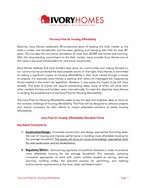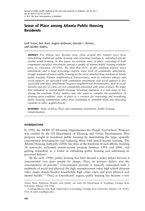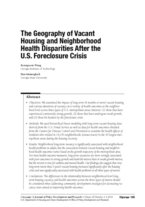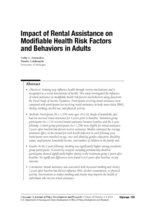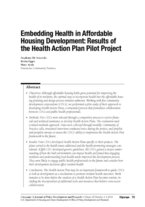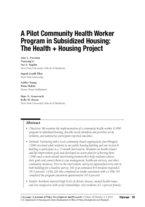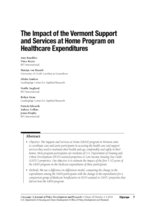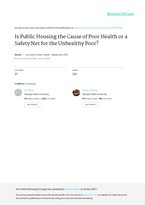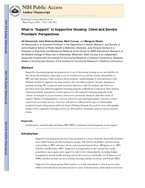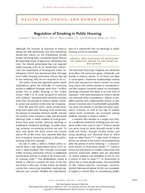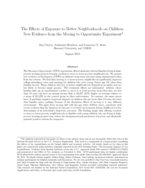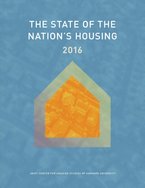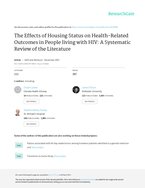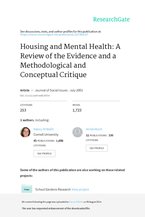Found 115 resources.
0
0
0
The Ivory Prize for Housing Affordability seeks to tap the best and brightest ideas to focus on the complex challenge of housing affordability. The Prize will be designed to advance projects and reward innovators for their efforts to impact adoptable solutions to tackle housing affordability.
Topics: Funding, Housing, Stability
0
0
0
This report compares the profile of the schools accessible to HUD-assisted and LIHTC households in 2016 to the profile of those accessible to other similar households within the same state or metropolitan area. In brief, we find that families receiving all four major types of federal housing assistance lived near lower performing and higher poverty schools than other poor families with children as well as other renters with children.
Topics: Education, Housing, Low-income, Mobility, Racial inequalities, Research, Youth
0
0
0
Annuities, long-term care insurance (LTCI), and reverse mortgages appear to offer important consumption smoothing benefits to the elderly, yet private markets for these products are small. A prominent idea is to combine LTCI and annuities to alleviate both supply (selection) and demand (liquidity) problems in these markets. This paper shows that if consumers typically liquidate home equity only in the event of illness, then LTCI and annuities become substitutes and less attractive. Simulations confirm that without home equity loans, both LTCI and constant real annuities may be welfare...
Topics: Asset building, Health, Housing, Medicaid / Medicare, Seniors
 Shared by Housing Is
on Aug 9, 2018
Shared by Housing Is
on Aug 9, 2018 0
0
0
For almost two decades now, cities around the country have been demolishing traditional public housing and relocating residents to subsidized private market rental housing. In this paper, we examine sense of place, consisting of both community and place attachment, among a sample of Atlanta public housing residents prior to relocation.
Topics: Asset building, Housing, Legislation & Policy, Low-income, Mental health, Mobility, Research, South, Stability
 Shared by Housing Is
on Aug 9, 2018
Shared by Housing Is
on Aug 9, 2018 0
1
0
We examined the impact of long-term (6 months or more) vacant housing and various durations of vacancy on a variety of health outcomes at the neighborhood level across three types of U.S. metropolitan areas (metros): (1) those that have experienced consistently strong growth, (2) those that have undergone weak growth, and (3) those hit hardest by the foreclosure crisis
Topics: Asset building, Asthma, Community development, Health, Housing, Low-income, Mental health, Metrics, Research, Safety, Transportation
 Shared by Housing Is
on Aug 1, 2018
Shared by Housing Is
on Aug 1, 2018 0
0
0
Housing may influence health through various mechanisms and is
recognized as a social determinant of health. This study investigated the influence of rental assistance on modifiable health risk factors and behaviors using data from the Panel Study of Income Dynamics. Participants receiving rental assistance were compared with participants not receiving rental assistance on body mass index (BMI), obesity, smoking, alcohol use, and physical activity
Topics: Exercise, Health, Housing, Low-income, Metrics, Nutrition, Obesity, Partnerships, Racial inequalities, Research, Smoke-free, Substance abuse
 Shared by Housing Is
on Aug 1, 2018
Shared by Housing Is
on Aug 1, 2018 0
0
0
Homelessness among children is correlated with developmental delays, fair or poor health, and high healthcare utilization. Associations of homelessness specifically among infants younger than 12 months, however, are unknown. This study evaluates homelessness during infancy as a risk for adverse infant and maternal health and hardship.
Topics: Child welfare, Depression, Disabilities, Dual-generation, Early childhood, Education, Family engagement, Food insecurity, Grade-level proficiency, Health, Homelessness, Housing, Low-income, Metrics, Partnerships, Pre-natal, Research, School-readiness, Youth
 Shared by Housing Is
on Aug 1, 2018
Shared by Housing Is
on Aug 1, 2018 0
0
0
This study draws on qualitative interview data to examine transitions into rent-assisted housing as they relate to diabetes self-management behaviors.
Topics: East Coast, Health, Homelessness, Housing, Low-income, Mental health, Metrics, Nutrition, Research, Stability
 Shared by Housing Is
on Aug 1, 2018
Shared by Housing Is
on Aug 1, 2018 0
0
0
Although affordable housing holds great potential for improving the
health of its residents, the optimal way to incorporate health into the affordable housing planning and design process remains unknown. Working with five community development corporations (CDCs), we performed a pilot study of their approach to developing Health Action Plans, a structured process that formalizes collaboration
between CDCs and public health professionals.
Topics: Depression, Green, Health, Housing, Low-income, Partnerships, Research
 Shared by Housing Is
on Aug 1, 2018
Shared by Housing Is
on Aug 1, 2018 0
0
0
We sought to learn more about how state- and locally funded rental
assistance programs were created, how they are structured, whom they serve, and how they are funded.
Topics: Cost effectiveness, Data sharing, Disabilities, Family engagement, Funding, Health, Homelessness, Housing, Legislation & Policy, Low-income, Partnerships, Research, Supportive housing
 Shared by Housing Is
on Aug 1, 2018
Shared by Housing Is
on Aug 1, 2018 0
0
0
Work requirements in public housing are highly controversial, and
little is known about their impacts. We examined how implementation of a work requirement paired with supportive services by Charlotte Housing Authority has impacted residents’ overall well-being. Although the policy might improve well-being
by increasing household income, it might also engender stress through greater housing precarity.
Topics: Depression, Disabilities, Education, Food insecurity, Health, Housing, Low-income, Medicaid / Medicare, Mental health, Metrics, MTW, Partnerships, Racial inequalities, Research, South, Workforce development
 Shared by Housing Is
on Aug 1, 2018
Shared by Housing Is
on Aug 1, 2018 0
0
0
We examine the implementation of a community health worker (CHW)
program in subsidized housing, describe needs identified and priorities set by residents, and summarize participant-reported outcomes.
Topics: East Coast, Health, Housing, Low-income, Mental health, Metrics, Partnerships, Place-based, Racial inequalities, Research
 Shared by Housing Is
on Aug 1, 2018
Shared by Housing Is
on Aug 1, 2018 0
0
0
The Support and Services at Home (SASH) program in Vermont aims
to coordinate care and assist participants in accessing the health care and support services they need to maintain their health and age comfortably and safely in their homes. Most program participants are residents of U.S. Department of Housing and Urban Development (HUD)-assisted properties or Low-Income Housing Tax Credit
(LIHTC) properties. Our objective is to estimate the impact of the first 5 1/2 years of the SASH program on the Medicare expenditures of these participants.
Topics: Cost effectiveness, Dual-eligibles, East Coast, Health, Home visiting, Housing, Legislation & Policy, Low-income, Medicaid / Medicare, Metrics, Seniors
 Shared by Housing Is
on Aug 1, 2018
Shared by Housing Is
on Aug 1, 2018 0
0
0
This review discusses how attitudes toward affordable housing are likely shaped by factors that influence other social policy attitudes— particularly ideology and stereotyping. The author concludes with recommendations and methods that planners can use to manage public opposition and influence attitudes toward affordable housing.
Topics: Housing, Legislation & Policy, Low-income, Racial inequalities, Research
 Shared by Housing Is
on Jul 27, 2018
Shared by Housing Is
on Jul 27, 2018 0
0
0
The purpose of this paper is to investigate the association between public housing and health conditions: specifically, we ask if residents entered public housing already ill or if public housing may cause the poor health of its residents.
Topics: Health, Housing, Low-income, Mental health, Metrics, Mobility, Nutrition, Racial inequalities, Research, South
 Shared by Housing Is
on Jul 27, 2018
Shared by Housing Is
on Jul 27, 2018 0
0
0
Supportive housing programs are proposed as a way of increasing housing access and stability for the chronically homeless, improving access to needed services, and decreasing vulnerability to HIV and other diseases. Little is known about residents’ understandings of and experiences with different models of supportive housing and how they fit within residents’ broader strategies to maintain housing. We conducted semi-structured interviews with 23 residents and 10 service providers from nine different supportive housing programs in Hartford, Connecticut. Data analysis explored residents’...
Topics: East Coast, Homelessness, Housing, Mental health, Place-based, Research, Substance abuse, Supportive housing
 Shared by Housing Is
on Jul 23, 2018
Shared by Housing Is
on Jul 23, 2018 0
0
0
The first two brief sections set the policy context for the ongoing housing policy debate on the social benefits of housing. Next is a five-section critical review of the last roughly quarter century of housing policy research. This is followed by a discussion of outstanding measurement issues before the concluding section.
Topics: Cost effectiveness, Health, Housing, Legislation & Policy, Low-income, Research, Safety
 Shared by Housing Is
on Jul 23, 2018
Shared by Housing Is
on Jul 23, 2018 0
0
0
In this article, we explore current law concerning residential smoking regulations and consider whether the implementation of a nationwide ban on smoking in public housing would be desirable.
Topics: Health, Housing, Legislation & Policy, Low-income, Smoke-free
 Shared by Housing Is
on Jul 23, 2018
Shared by Housing Is
on Jul 23, 2018 0
0
0
The Moving to Opportunity (MTO) experiment offered randomly selected families living in highpoverty housing projects housing vouchers to move to lower-poverty neighborhoods. We present new evidence on the impacts of MTO on children’s long-term outcomes using administrative data from tax returns. We find that moving to a lower-poverty neighborhood significantly improves college attendance rates and earnings for children who were young (below age 13) when their families moved. These children also live in better neighborhoods themselves as adults and are less likely to become single parents. The...
Topics: Child welfare, Cost effectiveness, Dual-generation, Education, Housing, Low-income, Mobility, Research
 Shared by Housing Is
on Jul 23, 2018
Shared by Housing Is
on Jul 23, 2018 0
0
0
To what extent does a change of address and transformation of the surrounding environment translate into a reduced sense of stigmatization of public housing residents? This article explores this question. Drawing from research at three new, mixed-income developments in Chicago, we examine changes in the regulatory and social environment and the perspectives and experiences of public housing residents living there. We find that although some forms of perceived stigma may have been ameliorated in these new settings, in other ways stigma and isolation has intensified.
Topics: Housing, Low-income, Mental health, Midwest, Mobility, Racial inequalities, Research, Safety
 Shared by Housing Is
on Jul 23, 2018
Shared by Housing Is
on Jul 23, 2018 0
0
0
Kaiser Permanente NW Community Benefit intends to award at least $1.5 million in community grants to support organizations that help people with behavioral health challenges to secure and maintain safe, stable housing. A minimum of five grants of up to $325,000 will be awarded for projects lasting 3 ½ years. Projects must include the involvement of peers or community health workers (CHWs) and must involve collaboration between housing providers, health care providers (including behavioral health service providers) and those community organizations employing peers or CHWs.
Topics: Funding, Health, Homelessness, Housing, Mental health, Pacific Northwest, Partnerships, Place-based, Preventative care, Substance abuse
 Shared by Housing Is
on Jul 20, 2018
Shared by Housing Is
on Jul 20, 2018 0
0
0
The need for more affordable rental housing is urgent. The record number of renters paying more than half their incomes for housing underscores the growing gap between market-rate costs and the rents that millions of households can afford. Governments at all levels must redouble their efforts to expand the affordable supply. And with growing recognition that children’s lifelong achievement rests on stable, safe, and healthy living conditions, policymakers must also ensure better access of minority and low-income households to higher opportunity communities.
Topics: Asset building, Housing
 Shared by Housing Is
on Jul 20, 2018
Shared by Housing Is
on Jul 20, 2018 0
0
0
The objective of this systematic review is to inform program and policy development and future research by examining the available empirical evidence on the effects of housing status on health-related outcomes in people living with HIV/AIDS.
Topics: Health, Housing, Legislation & Policy, Stability
 Shared by Housing Is
on Jul 20, 2018
Shared by Housing Is
on Jul 20, 2018 0
0
0
Despite the fact that people invest more financial, temporal, and psychological resources in their homes than in any other material entity, research on housing and mental health is remarkably underdeveloped. We critically review existing research on housing and mental health, considering housing type (e.g., singlefamily detached versus multiple dwelling), floor level, and housing quality (e.g., structural damage). We then discuss methodological and conceptual shortcomings of this literature and provide a theoretical framework for future research on housing quality and mental health.
Topics: Depression, Health, Housing, Mental health, Research
 Shared by Housing Is
on Jul 20, 2018
Shared by Housing Is
on Jul 20, 2018 
